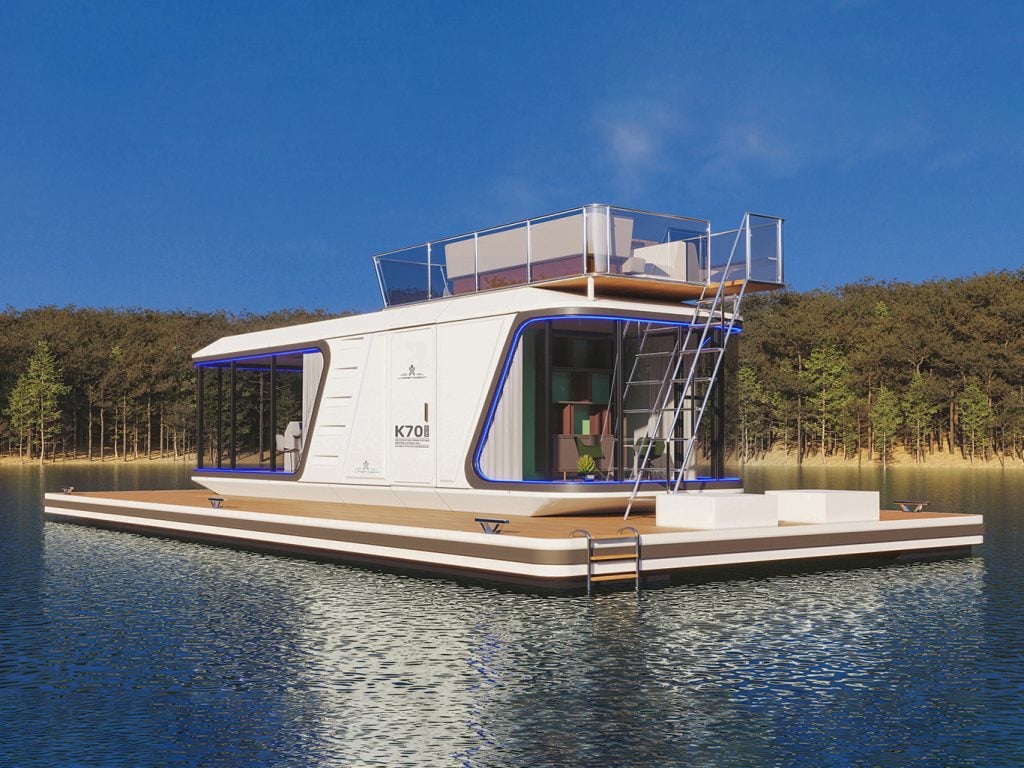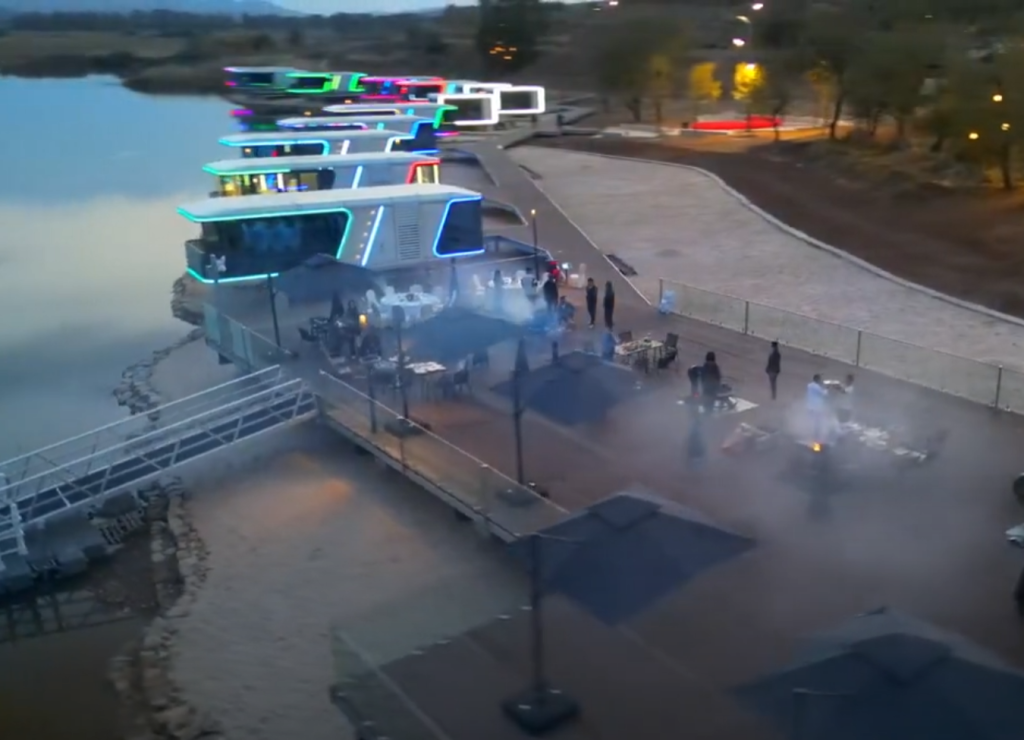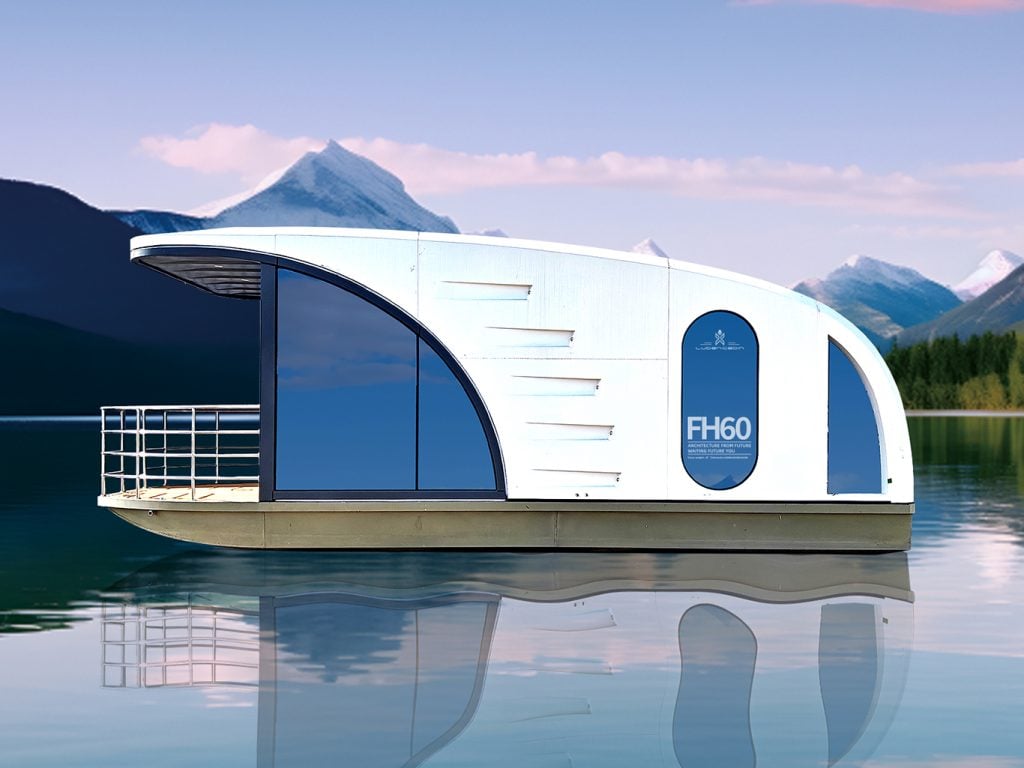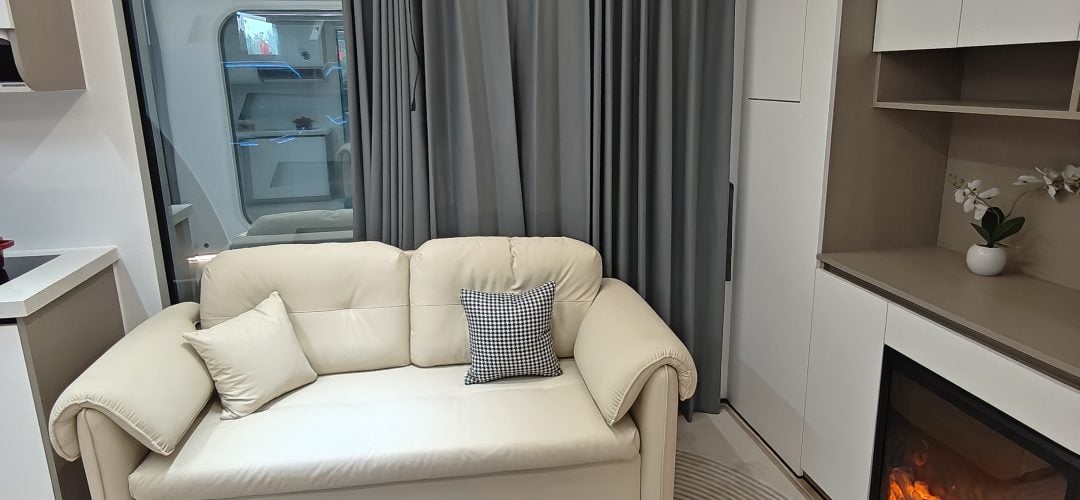A house floating on water represents a new level of freedom — blending modern design, sustainable architecture, and the dream of living close to nature. Whether it’s a capsule house, a floating home, or a tiny home on water, these innovative living spaces are redefining the way we think about comfort and mobility.

Table of Contents
1. What is a Floating House?
A floating house is an innovative structure designed to rest on water while offering the comfort and stability of a traditional home. Using advanced engineering and lightweight materials, it provides durability, safety, and a sense of harmony with the surrounding environment.
Unlike standard housing, a house floating on water allows residents to live freely — away from crowded cities, surrounded by nature, yet still enjoying the luxuries of modern life.
2. The Beauty of Floating Homes
The appeal of a floating house on water lies in its combination of functionality and serenity.
Key advantages include:
- Freedom of location– live peacefully by lakes, rivers, or calm coastal areas.
- Closer connection to nature– enjoy panoramic views and soothing sounds of water.
- Modern architecture– sleek lines and minimalist styles match the concept of smart living.
- Eco-friendly construction– floating homes minimize land use and environmental disruption.
- A floating homeis more than just a place to stay; it’s a lifestyle inspired by openness and creativity.
3. Capsule House Design: Compact and Intelligent Living
The capsule house design brings futuristic ideas into real life. Inspired by space capsule homes, this concept emphasizes intelligent use of limited space, modular construction, and sustainable materials.
Advantages of capsule living:
- Smart structure– every inch is optimized for function and comfort.
- Mobility– easy to relocate or expand as needed.
- Energy efficiency– equipped for solar panels and natural ventilation.
- Minimal maintenance– durable materials ensure long-term performance.
The house capsule concept proves that small doesn’t mean simple — it’s modern, efficient, and beautifully minimal.

4. Floating Houses and Prefabricated Innovation
Modern floating houses often use prefabricated techniques similar to capsule homes and folding houses. These homes are built in controlled factory environments, ensuring high precision, lower waste, and faster assembly.
Main benefits:
- Quick installation– ready within weeks instead of months.
- Consistent quality– controlled production guarantees reliable results.
- Cost efficiency– optimized design reduces overall construction costs.
- Flexible design– suitable for individuals, families, or creative retreats.
When combined with Luban Cabin modular concepts, floating homes can be easily customized to match personal lifestyle needs.
5. The Strength of Mobile Steel Frame Homes
A crucial part of floating or capsule structures is the use of mobile home steel frames. This foundation provides strength, flexibility, and safety — all while maintaining a lightweight, movable form.
Benefits of steel mobile homes:
- High durability– resistant to moisture, wind, and corrosion.
- Long lifespan– reliable and sturdy even in changing conditions.
- Design flexibility– easy to adapt layouts or add extensions.
- Sustainable materials– recyclable and environmentally responsible.
Steel structures also support the floating base, ensuring long-term stability for every floating home.
6. Tiny Homes and Capsule Living: The Art of Simplicity
Tiny homes and capsule homes reflect a shift toward intentional, minimalist living. These designs emphasize essential comfort and reduced clutter while maximizing efficiency.
Core strengths include:
- Compact yet complete– every detail has purpose and value.
- Affordable living– efficient production keeps costs manageable.
- Stylish design– modern aesthetics meet smart layouts.
- Eco-conscious lifestyle– smaller homes mean lower energy and material use.
The tiny home from China movement has shown that intelligent design can turn small spaces into luxurious, functional environments.

7. Floating Houses: Sustainability Meets Luxury
Living in a floating house is not only about mobility — it’s also about sustainability. These homes often integrate renewable systems such as solar energy, water recycling, and natural cooling.
Advantages of floating home living:
- Self-sufficient energy systems– designed for modern off-grid life.
- Minimal environmental footprint– built with sustainable and reusable materials.
- Elegant lifestyle– modern design that merges luxury with simplicity.
- Peaceful surroundings– unmatched tranquility compared to urban housing.
A floating house on water offers the perfect balance between technology and nature, between independence and comfort.
8. The Future of Modern Living: Capsule Meets Floating Design
When capsule house ideas meet floating house innovation, the result is the future of living — flexible, mobile, and eco-friendly.
These homes adapt to the evolving needs of modern people who value sustainability, smart design, and personal freedom.
The Luban Cabin concept further enhances this future, offering modular options that are easy to assemble, transport, and customize.
Living in a floating capsule home represents more than a trend — it’s the next step in redefining modern living.
Conclusion: Live Freely, Live Lightly
A house floating on water symbolizes freedom, simplicity, and modern creativity.
It brings people closer to nature while offering the stability and comfort of advanced design.
From capsule homes to folding houses, from tiny houses to space capsule homes, the world of architecture is moving toward mobility and efficiency.
Living on water is no longer a dream — it’s a lifestyle choice that combines art, innovation, and the beauty of freedom.
